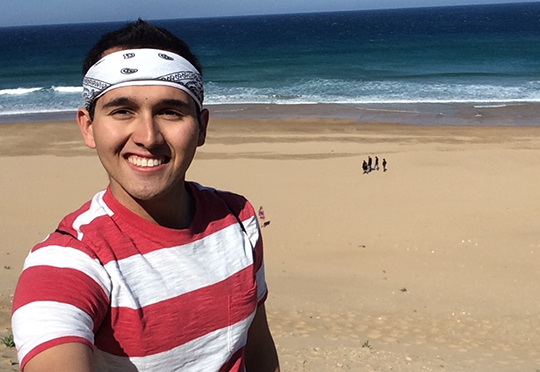 When Jaime Ramos was told the key to applying to a Peace Corps program was finding one that was a good fit, he barely had to think about his perfect scenario, he said. It would be in a Spanish-speaking country, working with students in their later teens to early 20s, that would make a positive difference in their lives … and likely his own.
When Jaime Ramos was told the key to applying to a Peace Corps program was finding one that was a good fit, he barely had to think about his perfect scenario, he said. It would be in a Spanish-speaking country, working with students in their later teens to early 20s, that would make a positive difference in their lives … and likely his own.
After graduating from Elizabethtown College this month, the communications major heads to Peru for more than two years to work as a Peace Corps youth development facilitator. The organization wanted individuals who have worked with older youth, who can communicate at an intermediate level of Spanish and who have participated in a variety of extracurricular activities, Ramos said.
That suited him to a T.
While at E-town, Ramos was a Kinesis Peer Academic Advisor for Momentum, the College’s program for first-generation college students—an organization Ramos was part of in his first year. He also was a tour guide, introducing high school students and families to the College, and, outside the classroom, was an athlete and a dancer.
He wanted to widen his knowledge of the culture and countries.”
For guidance, as he prepared for his senior year, Ramos turned to Montserrat Linares, associate professor of Spanish at Elizabethtown. He discussed his interest in having a Latin American experience and asked how to prepare himself to do so. “He wanted to widen his knowledge of the culture and countries,” she said.
As they explored different possibilities, Linares suggested the Peace Corps and talking to various alumni who had traveled to Latin America. “He has a good attitude, good communication,” she said of Ramos. “He is going to succeed at whatever he does.”
In Peru, Ramos will help junior high-age students build life skills, “how to carry themselves, how to be professional outside the classroom,” he said. Most of the students are not looking toward college, he said, but will go right to work. He will help them develop skills to get a job, how to conduct themselves in an interview. He also will work with them on positive extracurricular engagement.
Ramos said he began the application process in September 2017, taking a month to complete the paperwork and essays. Then, there was a Skype interview in December for which, he said, he “was a nervous wreck.” That went well, and he passed the intense medical backgrounds tests—teeth, eyes, blood tests, vaccines, deep health history—so he waited.
On Jan. 4, Ramos said, he got an email with the subject line “Peace Corps invitation to serve.” His relief and excitement, he said, were beyond words.
He’ll leave for Peru in September, immersing himself for three months in language training in Spanish and Runasimi, the Quechuan indigenous language, he said. Then, he moves in with a host family in the area of his assignment.
Ramos said he originally considered applying for a Fulbright but chose the Peace Corps specifically to immerse himself in Spanish culture “right out of the gate.” Linares agreed that the Peace Corps would be an excellent fit. “Out of 20,000 applications, only 4,000 are chosen,” said Ramos. “That’s just 1 in 5.” Also, the time investment for a Fulbright is just one year, whereas the Peace Corps is two years and three months. To add to the commitment, participants are highly discouraged from coming home. Ramos will leave Peru only for his sister’s wedding.
Though his family may visit him in Peru, his mother is unable to travel. “That’s the hardest part,” Ramos said, quietly. “Leaving my mom.” Though he is a bit heartbroken, he said, he knows his mother is proud of him and his devotion to service. That makes him “a little less sad.”

